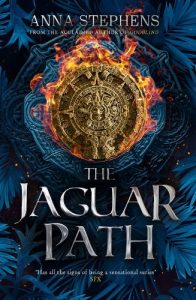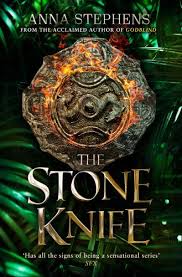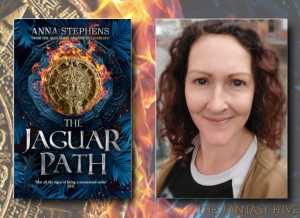Interview with Anna Stephens (THE JAGUAR PATH)
Anna Stephens is the author of the Godblind and the Songs of the Drowned trilogies.
Anna also writes for Black Library in their Age of Sigmar and Warhammer Horror worlds, and for Marvel Comics through their tie-in publisher Aconyte Books.
As a black belt in Shotokan Karate, Anna’s no stranger to the feeling of being hit in the face, which is more help than you would expect when writing fight scenes.
Welcome back to the Hive Anna!
Again, we’re sorry about that last time…
The fact that you have to say that every time I visit is telling. Very telling. Mostly what it tells people is that I’m a glutton for punishment. But thank you for having me again. I always look forward to our chats and I appreciate that you try and make me look clever, despite knowing the truth.
It’s what we’re here for. The challenge.
Also, apologies in advance for the length of this interview. You keep asking good questions and I get carried away answering them.
Congratulations on the release of The Jaguar Path, book two of The Songs of the Drowned! What can you tell readers about your newest book baby?
Oh, there’s so much I could talk about. I’m so pleased it’s finally been published – it’s been a long wait, though that does mirror the narrative, as two years have passed since the events in The Stone Knife. This means that the characters are firmly entrenched in their new lives, struggling to find a place and to survive, as well as deal with the ongoing horrors and degradations of being enslaved.
There are secrets to be revealed and people to be betrayed, strange new politics and ways of life to learn and navigate, and escapes of various kinds to be considered. The world for Xessa, Tayan and Lilla couldn’t be more different to that which they knew before, and they’re constantly living on a knife edge. Hopefully, despite the fact that it’s a big book, that makes for a pretty tense narrative.
But of course, they’re not our only characters. We meet some new secondary characters, and, as always, there are the Pechaqueh looming over all.
The whole series became more political than I’d expected, so it doesn’t proceed at the breakneck pace of the Godblind trilogy, but that does mean you can sink into the story and try – or fail – to anticipate the plot twists.
Subtle Anna, thanks. How many digs have you managed to fit in?
Not nearly enough.
Tell me Anna, why do you hate your readers?
I mean, there’s a lot of heartbreak. Again. What is it with you and emotionally traumatising your readers?
I can give the flippant answer, which is that it’s fun, and if I must suffer in the writing, you must suffer in the reading. And that’s very true. Writing a trilogy this big and meaty is a gruelling, exhausting process, and I shall bathe in the tears and agony of my readers in righteous reward for accomplishing it.
 The other answer is less flippant and more important. Enslavement is traumatising. Conquest, colonialism and empire are traumatising – they’re the systematic stripping away of land, belief, society, culture, law, religion and sense of self.
The other answer is less flippant and more important. Enslavement is traumatising. Conquest, colonialism and empire are traumatising – they’re the systematic stripping away of land, belief, society, culture, law, religion and sense of self.
It’s a stranger coming up to you in the street and saying “No, you’re doing it wrong. I’ll teach you the right way and oh, while we’re at it, I own your house and children now and you work for me. You won’t get paid, but I’ll feed you a little. No, you can’t pray to that god, and you can’t answer me back.” And then they beat you half to death while your family’s watching and you can’t do anything to stop it.
I wanted to write about colonialism in all its facets and that meant I couldn’t shy away from the very real atrocities committed. The Godblind trilogy was me deliberately fucking with readers because I could; this narrative arc is necessary. It’s a big difference – and a big responsibility.
One of the hardest aspects was working out a way to, as sensitively as I know how, tell the stories of all those people who came to believe the Empire’s lies. Sometimes, when it’s a choice between breaking and bending, you do the latter, just a little, thinking “this far and no more” and then it just escalates. And before you know it, you’re a fully signed-up member of the Empire and a vociferous believer and adherent in all their lies.
There’s a historical fiction novel I read back when I was probably too young to read such books, about Simon de Montfort, and a scene that stuck with me ever since: De Montfort has set up conversion houses in his domain for Jewish people, so that they might “come to the light of God and give up their heresy”. He is, naturally, disappointed that they are so unsuccessful, and he has a conversation with a Jewish man who asks him how much he loves his Christian god. De Montfort responds that he loves him with his whole heart, and the other man says, “so why would it be any different for me?” De Montfort’s response is basically: because your god is wrong and mine isn’t.
But then, a little later in the narrative, when they talk about those Jews who did convert, someone says of them: “they’re always the first to eat pork and the first to denounce their neighbours”.
As much as the first scene struck me and is important, that second scene was the one I kept coming back to when I was thinking about how The Jaguar Path might progress.
You’ve spoken in the past (here) about the difficulty in writing the second book in a trilogy (aka The Dreaded Book Two). How did you find this time round?
Oh, incredibly difficult!
Mostly because I decided, after The Stone Knife had already been published, to write a massive twist into Jaguar that changed one character’s entire storyline, including reframing everything they’d already done in TSK. The amount of finessing, finagling and fucking crying (alliteration FTW) I did was astonishing.
Was it —? I bet it was —, I’ll DM you
I also originally wrote this as having happened only a few months after the conclusion of The Stone Knife, but none of the themes and plot actually worked under those circumstances, which is why I chose to include a time jump. We need to see the world as it is now, in the broad and the specific sense – the repercussions from the war are still being felt by some characters – I’d argue neither Pilos nor the Singer are having the best time right now, and of course, the Tokob and Yaloh – but for everyone else, it’s just business as usual. Farm, create, trade, bicker, drink, gamble, fuck. Life for the ordinary citizen of the Empire of Songs is back to normal.
I wanted to show what normal is for different strata of society, and even among the same status – there’s Tayan, the lowest of Enet’s slaves, and there’s Xini, her estate slave, who acts more as an adviser and even confidant.
The difference between the slave warriors in the Melody and the dog warriors. The slave fighters in Pilos’s fighting pit and the free fighters. It was a really interesting process to build up these layers of meaning and dis/comfort with the Empire and people’s places within it, but it was also extremely time-consuming to make it seem natural.
Setting later definitely made it seem more natural, as the characters had time to get into their new routines, whilst still feeling the aftershocks of it all. Similarly with our own post-covid experiences.
And, of course, to come back to your point somewhat, some of my characters went rogue and did their own shit without my say so. That always makes things more difficult. Particularly someone at the ending of The Jaguar Path…
In our last interview you spoke about the nuances of writing about colonialism. As you said earlier, The Jaguar Path is an exploration of the aftermath of that, the immediate effect upon the enslaved, but the wider generational effects too.
How did you go about approaching the sensitive themes of identity and home?
Well, first off let me caveat that I’m writing all this as a white person and so, effectively, my history is that of the coloniser, not the colonised. There are things I’ve no doubt got wrong and I hope I’ll be forgiven, because they are honest mistakes.
But I read a lot of books. The Narrative of the Life of Frederick Douglass and Barracoon were two very important texts, as was The Wretched of The Earth, to give me perspective and help me think in the right ways about life under enslavement and the attendant rage and dignity and hopelessness and fear that goes with that.
I also watched films and documentaries – The Underground Railroad, 10 Years a Slave, Get Out were all important to help me decide what approach was appropriate to take.
Finally, I did my best to think and feel like people enslaved, whether newly or having been born to that state, despite knowing I’d never really understand. Empathy is, for me, absolutely vital in how I write. If I can’t feel what characters are feeling, I’ll never write them the way they deserve to be written. So I tried to imagine what it would be like if someone could just take away a family member for no good reason, or beat me and I wasn’t allowed to defend myself, or give me away as if I was property to someone to pay off a debt or gain favour or influence.
The excellent human and author Stewart Hotston was gracious enough to spend an evening at Fantasycon 2021 talking about these issues with me, and he beta read an early draft. One of his comments was to remember that Tayan (in this instance) was no more important to Enet than a plate or a cup. He meant exactly as little to her as that and she probably wouldn’t even notice he was gone unless she needed something specific only he could provide. It was a very sobering reminder and something I kept at the forefront of my mind during subsequent drafting.
The Jaguar Path itself is that of the warrior, but you explore a myriad different ways people can walk that path. Without any spoilers, whose fight was the most difficult to portray?
And so we come to it at last, the impossible question. The most spoiler-filled answer would probably also be the most unexpected, but it’s too spoilery, so I can’t say it.
To DMs again….
 I’m going to go with Tayan, who never wanted to walk the jaguar path at all and, arguably, isn’t walking it now. His arc was one of the most difficult to write because his method of resistance is the subtlest, the one that relies purely on his own strength of will and belief. And the song is nothing great at moulding the human will to its desires.
I’m going to go with Tayan, who never wanted to walk the jaguar path at all and, arguably, isn’t walking it now. His arc was one of the most difficult to write because his method of resistance is the subtlest, the one that relies purely on his own strength of will and belief. And the song is nothing great at moulding the human will to its desires.
He has very few martial skills and absolutely no chance of winning in a fair – or even unfair – fight against the Chorus warriors in the great pyramid.
He’s trapped in the very heart of power and corruption, constantly at the mercy of the song at its strongest, and he made that desperate promise right at the end of The Stone Knife – a promise to save the Singer. He’s now trapped in that promise, in the pyramid, in Enet’s possession.
His situation is seemingly impossible. I look forward to making him suffer in book 3.
Because you haven’t made him suffer enough yet?!
And which path would you find yourself on?
The path to an early grave. There’s a reason I wrote Tayan as short-sighted, though I extended him far more grace than has been shown me. If I ended up in that world with my eyesight, I’d walk face-first into a snake within 10 minutes and get eaten.
But, snakes aside, I would resist. I’d fight; of course I would. But I’d also do everything I could to keep the people I love safe, and that’s how they get you, isn’t it? Do what you like to me, that’s one thing, but threaten those I love and see me crumble.
That’s both the ugly genius and the unutterable cruelty of colonialism.
Once again you really put your characters through the mill. Who do you think you were hardest on? Who do you feel most guilty for and why is it Xessa?
Ha! Do you think so? She does get dealt a poor hand, I’ll give you that.
I mean they all do, to be fair. You are magnanimous in your torture.
I like to spread it around with a big shovel.
Who’d win in a fight to the death, Xessa or Lilla?
Absolutely the fuck not.
Spoilsport
I wasn’t going to bring up the twists, due to your incessant gloating, but there are some epic twists and betrayals in store for the readers. Just how pleased with yourself are you?
I believe I told you I was wallowing around in my smug self-satisfaction like Scrooge McDuck in his pile of money?
You did! I have screenshots
I’m still there. For the twist you specifically are referring to, I honestly thought it was pretty obvious that was the direction the narrative was going, so that accounts for a lot of smug and childish face-pulling next time we meet. The other twists, about [REDACTED], [REDACTED] and [REDACTED], I worked really hard to conceal.
In our last interview, you thought I was calling you a good doggo, so how exactly do you go about creating such great twists and masquerading as a genius?
First off, rude. Second, we’ve established I have strong puppy energy and that’s not my fault. You will deal with my excitable bouncing and easily distracted nature and lack of physical boundaries and you will enjoy it.
But to answer your question with a modicum of seriousness – which is all I have left after those tough earlier questions – I, uh, don’t really know? As in, I wish I planned them out from the start, but they tend to take me as much by surprise as anyone else.
Obviously there’s something going on in my subconscious, but, to quote Devin Madson, ‘it’d be nice if it waved a flag every now and then and let us know it was cooking up something juicy.’
At the moment you’re working on book three of Songs of the Drowned, can you give us any hints of what to expect? As in, aside from the obvious heartbreak and betrayal…
MOAR twists. At least one, if not three, more betrayals. The death of hope and love and your favourite characters. Tragedy.
Redemption. Acceptance. New love and a new life. At least some sort of healing as grief becomes scars.
How are you finding juggling writing and working full time?
We hates it, precious. We hates it.
That said, we very much likes the financial security and are still adjusting to not living below minimum wage, which is nice. I’m a proud – and increasingly exhausted – member of the 6am writing club, which becomes the 5.30am-and-crying club during approaching deadlines.
And in amongst that, you’ve started hosting a writing course?
I have! I’ve currently got a deep-dive worldbuilding for spec-fic writers course that’s live, and a great group of alumni who all seemed to really enjoy it.
Now that I’ve handed in Songs 3, I want to finish up my writing combat mini-course and then later this year produce a deep-dive into characterisation course.
And, to celebrate the launch of The Jaguar Path, anyone signing up to the worldbuilding course in February and quoting Jaguar10 gets 10% off!
Thank you so much for coming back! Good luck with the release of The Jaguar Path, and if could just pop Book 3 down by the door before you leave that would be great…
The Jaguar Path is out today! You can grab your copy from Bookshop.org

